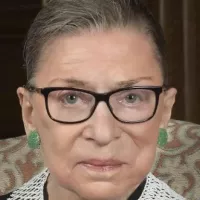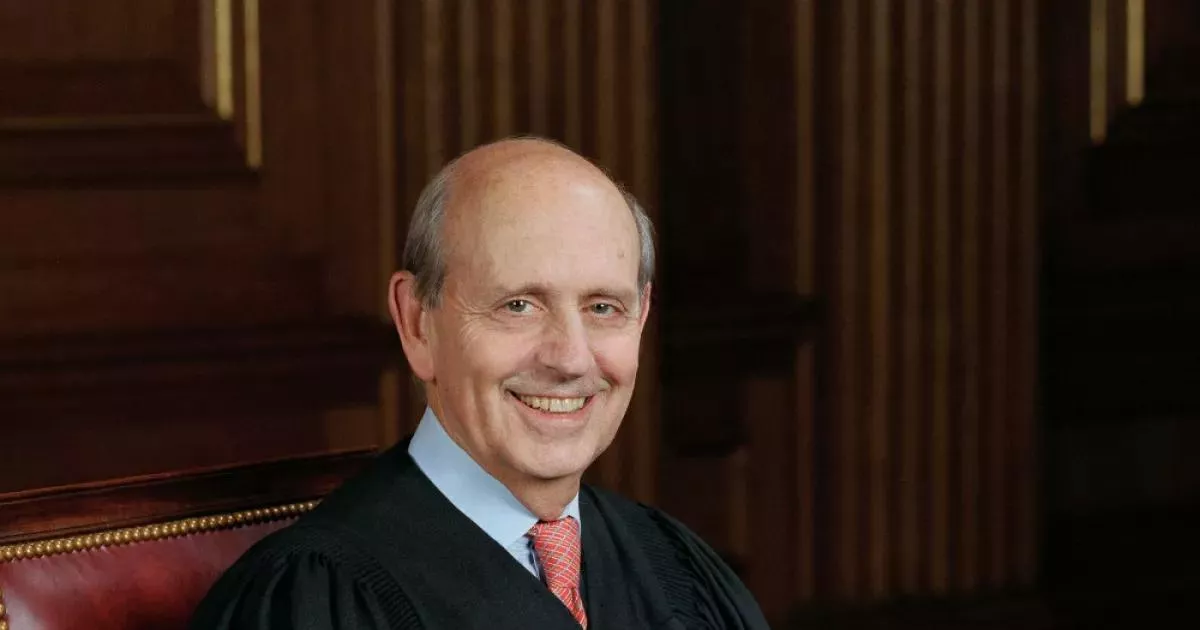Stephen Gerald Breyer was an Associate Justice of the U.S. Supreme Court from 1994 to 2022, appointed by President Bill Clinton. Known for his liberal stance, he succeeded Justice Harry Blackmun. Following his retirement, Breyer assumed the role of Byrne Professor of Administrative Law and Process at Harvard Law School.
August 15, 1938: Stephen Gerald Breyer is born
On August 15, 1938, Stephen Gerald Breyer was born.
1955: Stephen Breyer graduates high school
Stephen Breyer graduated high school in 1955.
1959: Stephen Breyer graduates from Stanford University
Stephen Breyer graduated with a Bachelor of Arts degree with highest honors and membership in Phi Beta Kappa from Stanford University in 1959.
1961: Stephen Breyer receives a B.A. from the University of Oxford
As a Marshall Scholar, Stephen Breyer studied philosophy, politics, and economics at Magdalen College, Oxford, receiving a first-class honors B.A. in 1961.
1964: Stephen Breyer serves as a law clerk to U.S. Supreme Court justice Arthur Goldberg
From 1964 to 1965, Stephen Breyer served as a law clerk to U.S. Supreme Court justice Arthur Goldberg.
1964: Stephen Breyer graduates from Harvard Law School
Stephen Breyer graduated from Harvard Law School magna cum laude with a Bachelor of Laws degree in 1964. While attending, he was an articles editor of the Harvard Law Review.
1965: Stephen Breyer begins working for the U.S. Department of Justice
Following his clerkship, Stephen Breyer worked briefly as a fact-checker for the Warren Commission and then as a special assistant to the Assistant Attorney General in the U.S. Department of Justice's Antitrust Division.
1965: Stephen Breyer is honorably discharged from the United States Army Reserve
In 1965, Stephen Breyer was honorably discharged from the United States Army Reserve, where he reached the rank of corporal.
1967: Stephen Breyer begins teaching at Harvard Law School
Stephen Breyer begins teaching at Harvard Law School in 1967, specializing in administrative law and writing textbooks.
1967: Stephen Breyer marries Joanna Freda Hare
Stephen Breyer married The Honourable Joanna Freda Hare, a psychologist and member of the British aristocracy, in 1967.
1967: Stephen Breyer returns to Harvard Law School
Stephen Breyer returned to Harvard Law School in 1967 as an assistant professor, teaching there until 1980.
1970: Stephen Breyer authors "The Uneasy Case for Copyright"
In 1970, Stephen Breyer authored "The Uneasy Case for Copyright," a widely cited skeptical examination of copyright.
1973: Stephen Breyer serves as assistant special prosecutor on the Watergate Special Prosecution Force
During 1973, Stephen Breyer took a leave of absence from teaching to serve as assistant special prosecutor on the Watergate Special Prosecution Force.
1974: Stephen Breyer becomes a special counsel to the U.S. Senate Committee on the Judiciary
Starting in 1974, Stephen Breyer served as a special counsel to the U.S. Senate Committee on the Judiciary until 1975.
1975: Stephen Breyer concludes his work as a special counsel to the U.S. Senate Committee on the Judiciary
Stephen Breyer concluded his service as special counsel to the U.S. Senate Committee on the Judiciary in 1975.
1977: Stephen Breyer begins a joint appointment at Harvard Kennedy School
While still teaching at Harvard Law School, Stephen Breyer took on a joint appointment at Harvard Kennedy School, where he worked from 1977 to 1980.
1979: Stephen Breyer is the chief counsel of the U.S. Senate Committee on the Judiciary
From 1979 to 1980, Stephen Breyer served as chief counsel of the U.S. Senate Committee on the Judiciary. During this time, he worked with the committee's chairman, Senator Edward M. Kennedy, to pass the Airline Deregulation Act.
February 20, 1980: Richard S. Arnold Confirmed to the Eighth Circuit
On February 20, 1980, Richard S. Arnold was confirmed by the Senate to the United States Court of Appeals for the Eighth Circuit, nominated by President Jimmy Carter.
November 13, 1980: President Jimmy Carter nominates Stephen Breyer to the First Circuit
On November 13, 1980, after losing his bid for reelection, President Jimmy Carter nominated Stephen Breyer to the First Circuit.
December 9, 1980: The U.S. Senate confirms Stephen Breyer's nomination to the First Circuit
The U.S. Senate confirmed Stephen Breyer's nomination to the First Circuit on December 9, 1980, by a vote of 80–10.
December 10, 1980: Stephen Breyer is commissioned as a judge on the U.S. Court of Appeals for the First Circuit
Stephen Breyer received his commission on December 10, 1980.
1980: Stephen Breyer concludes his work as chief counsel of the U.S. Senate Committee on the Judiciary
In 1980, Stephen Breyer finished his service as chief counsel of the U.S. Senate Committee on the Judiciary.
1980: Stephen Breyer is appointed to the U.S. Court of Appeals for the First Circuit
Stephen Breyer begins serving as a federal judge on the U.S. Court of Appeals for the First Circuit starting in 1980.
1980: Stephen Breyer concludes teaching at Harvard Law School
Stephen Breyer concluded his time teaching at Harvard Law School in 1980.
1985: Stephen Breyer joins the United States Sentencing Commission
Stephen Breyer served on the United States Sentencing Commission from 1985 to 1989.
1988: Bruce Babbitt runs for president
Bruce Babbitt ran for president in 1988.
1989: Stephen Breyer concludes his service on the United States Sentencing Commission
Stephen Breyer concluded his service on the United States Sentencing Commission in 1989.
1990: Stephen Breyer joins the Judicial Conference of the United States
From 1990 to 1994, Stephen Breyer served on the Judicial Conference of the United States.
1990: Richard S. Arnold's Tenure as Chief Judge
Richard S. Arnold served as chief judge and a member of the Judicial Conference of the United States until 1990.
1990: Stephen Breyer becomes Chief Judge of the U.S. Court of Appeals for the First Circuit
Stephen Breyer became the Chief Judge of the U.S. Court of Appeals for the First Circuit in 1990, a role he held until 1994.
1993: President Clinton considers Stephen Breyer for the Supreme Court
President Bill Clinton considered both Stephen Breyer and Ruth Bader Ginsburg for the Supreme Court seat vacated by Byron White in 1993. He ultimately appointed Ginsburg.
May 17, 1994: Nomination for Associate Justice
Despite initial reservations, on May 17, 1994, President Clinton nominated Stephen Breyer as an associate justice of the United States Supreme Court, influenced by Senators Ted Kennedy and Tom Harkin.
July 29, 1994: Confirmation as Associate Justice
On July 29, 1994, the Senate confirmed Stephen Breyer as an associate justice by a vote of 87 to 9.
1994: Stephen Breyer is nominated to the U.S. Supreme Court
In 1994, Stephen Breyer was nominated by President Bill Clinton to serve as an associate justice of the U.S. Supreme Court, replacing retiring justice Harry Blackmun.
1994: Breyer Demonstrates Consistent Judicial Philosophy
Since 1994, Justice Breyer consistently demonstrated his judicial philosophy, marked by strong support for abortion rights, deference to Congress in overturning legislation, and a belief in the persuasive value of foreign and international law in court decisions.
1994: Stephen Breyer concludes his service on the Judicial Conference of the United States
Stephen Breyer concluded his service on the Judicial Conference of the United States in 1994.
1994: Stephen Breyer concludes his judgeship on the U.S. Court of Appeals for the First Circuit
Stephen Breyer served on the U.S. Court of Appeals for the First Circuit until 1994.
1994: Uruguay Round Agreements Act
The Uruguay Round Agreements Act of 1994, which Breyer later dissented against aspects of in Golan v. Holder, was enacted.
1994: Stephen Breyer is considered for the Supreme Court vacancy left by Harry Blackmun
When Harry Blackmun retired from the Supreme Court in 1994, President Clinton considered Stephen Breyer for the vacancy.
1997: Scalia Publishes 'A Matter of Interpretation'
Justice Antonin Scalia's 1997 book, "A Matter of Interpretation," advocated for an originalist approach to interpreting legal texts, emphasizing the original meaning of the words. This book prompted Breyer's response in "Active Liberty."
2000: Friends of the Earth, Inc. v. Laidlaw Environmental Services, Inc. Ruling
In 2000, Breyer sided with the majority in Friends of the Earth, Inc. v. Laidlaw Environmental Services, Inc., granting standing to individuals affected by pollution to sue industrial polluters.
2000: Stenberg v. Carhart Ruling
In 2000, Breyer wrote the majority opinion in Stenberg v. Carhart, which struck down a Nebraska law banning partial-birth abortion.
January 2001: Bill Clinton's presidency concludes
Bill Clinton's presidency concluded in January 2001.
January 15, 2003: Dissent in Eldred v. Ashcroft
On January 15, 2003, Breyer dissented in Eldred v. Ashcroft, arguing that the retroactive extension of copyright protection granted by the Copyright Term Extension Act effectively amounted to perpetual copyright, violating the Copyright Clause and First Amendment. He argued the extension would stifle creativity and harm education.
April 28, 2004: Breyer Dissents in Partisan Gerrymandering Case
On April 28, 2004, Justice Breyer dissented in Vieth v. Jubelirer, a case concerning partisan gerrymandering. Breyer argued that while not all gerrymandering is unconstitutional, courts can intervene when it undermines democratic principles and causes harm.
2004: Election to the American Philosophical Society
Stephen Breyer was honored with election to the American Philosophical Society in 2004.
2005: Breyer Publishes 'Active Liberty: Interpreting Our Democratic Constitution'
In 2005, Justice Breyer published "Active Liberty: Interpreting Our Democratic Constitution," outlining his approach to interpreting legal texts. He emphasizes considering the text's purpose and the real-world consequences of rulings, contrasting with Justice Scalia's focus on original meaning.
2005: Stephen Breyer authors "Active Liberty"
In 2005, Stephen Breyer published "Active Liberty," a book sharing his views on legal theory and the role of the judiciary.
2005: Concurrence in MGM Studios, Inc. v. Grokster, Ltd.
In 2005, while joining the unanimous court in MGM Studios, Inc. v. Grokster, Ltd., Breyer wrote a concurrence arguing that peer-to-peer file-sharing companies could be protected under the Sony doctrine without evidence of inducement.
March 2006: Breyer Discusses Democracy and Civil Rights
In March 2006, at the New York Historical Society, Justice Breyer discussed the role of democracy in achieving social justice. He argued that while democracy is essential, it doesn't always guarantee equality and fairness, highlighting the importance of legal protections like universal suffrage in advancing civil rights.
2006: Breyer Rules Against Redistricting Plan Based on Voting Rights Act
In 2006, Justice Breyer was part of a 5-4 majority that struck down a Texas redistricting plan for violating the Voting Rights Act. He found that the plan diluted minority voting strength, demonstrating his commitment to fair electoral practices.
2007: Distinguished Eagle Scout Award
In 2007, Stephen Breyer received the Distinguished Eagle Scout Award from the Boy Scouts of America.
December 12, 2010: Breyer's Comments on Gun Regulation on Fox News Sunday
During an appearance on Fox News Sunday on December 12, 2010, Stephen Breyer voiced his stance on gun regulation. He asserted that the Founding Fathers, based on historical context and values, didn't intend for unregulated guns, supporting his dissenting view in the District of Columbia v. Heller case.
2010: Breyer's Decision to Attend State of the Union Address
Following the controversy surrounding Justice Samuel Alito's reaction to President Barack Obama's criticism of the Supreme Court's Citizens United v. FEC ruling during the 2010 State of the Union address, Stephen Breyer publicly stated his intention to continue attending the address.
2010: Publication of "Making Our Democracy Work: A Judge's View"
In 2010, Stephen Breyer authored his second book, "Making Our Democracy Work: A Judge's View," where he delves into the tools judges utilize to interpret legal provisions. He contrasts his pragmatic approach, emphasizing "purpose" and "consequences," with the textualist view favored by justices like Scalia.
2010: Breyer Supports Affordable Care Act
Since its passage in 2010, Justice Breyer consistently voted to uphold the Affordable Care Act, demonstrating his support for the legislation's aims and provisions.
2011: Breyer Sides with Oil Refineries in Renewable Fuels Case
In 2011, Justice Breyer sided with the majority in Hollyfrontier Cheyenne Refining v. Renewable Fuels Association, ruling in favor of oil refineries. The court found that refineries experiencing financial hardship didn't require annual exemptions from federal renewable fuels policy since 2011 to qualify for an exemption.
2012: Dissent in Golan v. Holder
Breyer expressed similar concerns regarding copyright in his 2012 dissent in Golan v. Holder, which upheld the Uruguay Round Agreements Act's copyright provisions.
June 25, 2014: American Broadcasting Cos., Inc. v. Aereo, Inc. Ruling
On June 25, 2014, Breyer delivered the majority opinion in American Broadcasting Cos., Inc. v. Aereo, Inc., ruling that Aereo's streaming service violated copyright law as it closely resembled cable operations.
2015: Dissent in Glossip v. Gross
In 2015, Breyer dissented in Glossip v. Gross, questioning the constitutionality of the death penalty itself. He argued that it was "highly likely" that the death penalty violates the Eighth Amendment.
2015: Breyer's Involvement in FERC v. Electric Power Supply Ass'n
In 2015, Breyer faced scrutiny for participating in a case involving Johnson Controls after his wife sold stock in the company. Although he came back into compliance, the incident raised concerns.
2015: Publication of "The Court and the World: American Law and the New Global Realities"
Stephen Breyer published his third book, "The Court and the World: American Law and the New Global Realities," in 2015. This work explores the intersection of U.S. and international law, advocating for the consideration of global realities in U.S. legal cases.
2018: Appointment as Chair of the Pritzker Architecture Prize Jury
Stephen Breyer took on the role of chair of the Pritzker Architecture Prize jury in 2018, succeeding Glenn Murcutt.
June 2019: Breyer Dissents Again in Gerrymandering Case
Justice Breyer continued his stance against partisan gerrymandering in June 2019, dissenting in Rucho v. Common Cause. The court ruled 5-4 that gerrymandering claims were beyond the reach of federal courts, a decision Breyer disagreed with.
2019: Department of Commerce v. New York
In 2019, Breyer joined the 5-4 majority in Department of Commerce v. New York, ruling against the inclusion of a citizenship question on the census due to procedural errors. He also held the question itself as unconstitutional.
April 23, 2020: County of Maui v. Hawaii Wildlife Fund Ruling
On April 23, 2020, Breyer authored the majority opinion in County of Maui v. Hawaii Wildlife Fund, ruling that the County of Maui needed a permit for releasing groundwater pollution into the ocean under the Clean Water Act. This decision was considered a win for environmental protection.
June 29, 2020: June Medical Services v. Russo Ruling
On June 29, 2020, Breyer authored the plurality opinion in June Medical Services v. Russo, striking down a Louisiana abortion law requiring doctors performing abortions to have admitting privileges at nearby hospitals. He reaffirmed the "benefits and burdens" test from Whole Woman's Health v. Hellerstedt.
July 2020: Reiterating Stance on the Death Penalty
In July 2020, Breyer reiterated his stance on the death penalty, suggesting that it might violate the Constitution and calling for further examination of the issue.
July 31, 2020: Breyer Dissents in Border Wall Ruling
On July 31, 2020, Justice Breyer dissented in a 5-4 Supreme Court decision that allowed the construction of the U.S.-Mexico border wall to proceed. Breyer argued that the wall's environmental impact, particularly on wildlife and water flow in the Sonoran Desert, warranted halting its construction. He expressed concern that allowing construction to continue could prejudice the case's final outcome.
December 18, 2020: Dissent in Trump v. New York
On December 18, 2020, Breyer dissented in Trump v. New York, arguing against the Court's decision to sidestep the case concerning the exclusion of undocumented immigrants from the census. He believed the Court should have ruled in favor of the challengers.
2020: Calls for Breyer's Retirement Emerge
Following the 2020 elections, progressive activists and Democratic lawmakers began urging Justice Breyer to retire, hoping to create a vacancy for President Biden to fill with a younger liberal justice.
March 4, 2021: Breyer Dissents in Environmental Information Access Case
On March 4, 2021, Justice Breyer dissented in the case of United States Fish and Wildlife Serv. v. Sierra Club, Inc. The case centered on the Sierra Club's request for access to government documents related to environmental regulations. Breyer argued that the public's right to access such information outweighed the government's interest in keeping the documents confidential.
April 5, 2021: Google v. Oracle Ruling
On April 5, 2021, Breyer authored the majority opinion in Google v. Oracle, finding that Google's copying of Java declaring code constituted fair use, as it was essential for interoperability and did not significantly harm Oracle's market.
June 17, 2021: Breyer Authors Majority Opinion Upholding Affordable Care Act
On June 17, 2021, Justice Breyer authored the majority opinion in California v. Texas, a 7-2 decision upholding the Affordable Care Act's individual mandate. Breyer argued that the states challenging the mandate lacked standing to sue, emphasizing the need for demonstrable harm caused by a law's enforcement.
August 2021: Breyer Addresses Retirement Calls
In August 2021, amidst calls for his retirement, Justice Breyer expressed his desire to retire before his death in a New York Times interview. He acknowledged the significance of his successor's potential impact on the court's direction.
September 2021: Breyer Reiterates Retirement Stance
During a September 2021 interview, Justice Breyer reiterated his position on retirement, stating that while he acknowledged the opinions of those urging him to step down, he would base his decision on various factors and would not remain on the court indefinitely.
September 2021: Interview on Fareed Zakaria GPS
In September 2021, Stephen Breyer participated in an interview on CNN's Fareed Zakaria GPS. He fielded questions regarding his retirement plans and took the opportunity to promote his book, "The Authority of the Court and the Peril of Politics."
September 2021: Appearance on The Late Show with Stephen Colbert
Stephen Breyer appeared as a guest on The Late Show with Stephen Colbert in September 2021. During his appearance, he engaged in discussions about the Texas Heartbeat Act and addressed his stance on retirement.
2021: Breyer's Final Year on the Court Begins
As the 2021-2022 term commenced, it marked the final year of Justice Breyer's tenure on the Supreme Court, culminating in his retirement announcement.
2021: Breyer Dissents in Voting Rights and Election Cases
Throughout 2021, Justice Breyer consistently dissented in significant voting rights and election cases. He disagreed with the majority's decision in Shelby County v. Holder, which struck down a key provision of the Voting Rights Act. He also dissented in cases related to voting deadlines during the COVID-19 pandemic and Arizona's voting restrictions, demonstrating his commitment to protecting voting access.
January 27, 2022: Stephen Breyer announces his retirement from the Supreme Court
On January 27, 2022, alongside President Joe Biden, Stephen Breyer publicly announced his intention to retire from the Supreme Court.
February 25, 2022: President Biden nominates Ketanji Brown Jackson to succeed Stephen Breyer
President Biden nominated Ketanji Brown Jackson, a judge on the U.S. Court of Appeals for the District of Columbia Circuit and a former law clerk for Breyer, to succeed Breyer on the Supreme Court on February 25, 2022.
April 7, 2022: The Senate confirms Ketanji Brown Jackson
On April 7, 2022, the Senate voted 53–47 to confirm Ketanji Brown Jackson to the Supreme Court.
June 30, 2022: Stephen Breyer officially steps down from the Supreme Court
Stephen Breyer remained on the Supreme Court until June 30, 2022.
2022: Dissent in Dobbs v. Jackson Women's Health Organization
In 2022, Breyer dissented in Dobbs v. Jackson Women's Health Organization, which overturned Roe v. Wade.
2022: Stephen Breyer retires from the U.S. Supreme Court
Stephen Breyer retired from his position as an associate justice of the U.S. Supreme Court in 2022. He became affiliated with Harvard Law School as the Byrne Professor of Administrative Law and Process.
March 26, 2024: Publication of "Reading the Constitution: Why I Chose Pragmatism, Not Textualism"
On March 26, 2024, Stephen Breyer released his fourth book, "Reading the Constitution: Why I Chose Pragmatism, Not Textualism." In conjunction with the release, he participated in an interview where he critiqued textualism, a judicial philosophy favored by conservative justices, arguing its limitations in achieving the goals of those who crafted legal statutes and the Constitution.
Mentioned in this timeline
Fox News Channel FNC is a conservative American news and...

Barack Obama the th U S President - was the...

Bill Clinton served as the nd U S President from...

Ruth Bader Ginsburg was an American lawyer and Supreme Court...

Google LLC is a multinational technology corporation specializing in a...

Joe Biden is an American politician who served as the...
Trending
14 minutes ago Pokemon Celebrates 30 Years: A Cultural Phenomenon with Multimillion-Dollar Cards

14 minutes ago Daylight Saving Time 2026: Prepare to set your clocks forward and lose sleep.

14 minutes ago Indiana Investigates CenterPoint Energy Amid Bill Concerns and New Utility Law.

15 minutes ago Galatasaray's Champions League opponent revealed; Liverpool legend comments on Juventus match; Real Madrid faces Man City.

2 hours ago Google Maps to fully function in South Korea after data agreement.

3 hours ago CDC Panel to Discuss COVID-19 Vaccine Injuries Following RFK Jr.'s Meeting
Popular

Jesse Jackson is an American civil rights activist politician and...

Barack Obama the th U S President - was the...

Susan Rice is an American diplomat and public official prominent...

XXXTentacion born Jahseh Dwayne Ricardo Onfroy was a controversial yet...

Michael Joseph Jackson the King of Pop was a highly...

Kashyap Pramod Patel is an American lawyer who became the...
